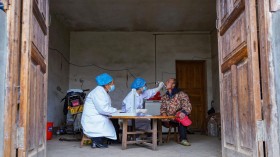The CDC mentions that as many as 93.6% of children and young adults made contact with a medical professional last year, but as encouraging as that statistic is, we have to ask the question if those visits are as effective as we first believe. As a child gets older, medical screening can lay the groundwork for medical diagnoses for the rest of the child's life. Most of these visits recorded by the CDC are usually for things like a sore throat or a skinned knee. They don't take into account medical screening, which makes up a minimum volume of doctors' visits for children and teens. This is overlooking a severe gap in raising kids to be healthy adults. The scientific journal Deutsches Arzteblatt mentions that detecting problems early can lead to effective treatment through early intervention. Taking kids in for initial screening can help your child stave off problems before they arise.
Allergen Screening
The Asthma and Allergy Foundation of America (AAFA) notes that allergies represent the 6th most common form of chronic illness in the US. There is a tendency for kids who have minor allergies like eczema to develop more allergies as they get older. The major problem is a sleeping allergic reaction called eosinophilic esophagitis (EoE), which, as the name suggests, is an extreme inflammatory reaction of the esophagus that sometimes requires a mesh. Symptoms can be similar to anaphylactic food poisoning, including stomachache or painful swallowing. Having a child who already has allergies screened for potential issues like this could help ID the reaction and can aid in giving you prevention strategies to avoid the discomfort.
Screening for Obesity
In 2017, Time Magazine noted that as many as 40% of Americans were obese and the trend wasn't slowing down any time soon. The reason obesity is such a huge problem is because of the added health effects that usually come coupled with it. Personal health issues ranging from high blood pressure to asthma can come bundled with obesity, and knowing that your child is headed down this road can help to combat it before the condition sets in. The most significant issue is that despite there being such uproar over the rate of obesity in the US, very few parents notice their children getting obese. According to the journal Academic Pediatrics, more than half of parents tend to underestimate the weight of their own children. Obesity screening removes this personal reading of the weight of a child and allows a parent to get a professional opinion on whether the child is knocking on obesity's door. Being aware of the looming problem of obesity allows a parent to deal with it by changing diet or increasing the physical activity a child gets. It is a lot easier to avoid obesity if the behaviors that help are ingrained in an individual as a child.
Screening for Mental Health Problems
The National Alliance on Mental Illness (NAMI) states that as many as 18.5% of adults (approximately one in five) have mental illness within any given year. It's not just adults that are experiencing these problems. Reuters reports that as many as one in six children between the ages of six and seventeen have mental health problems and less than half of them get treatment for it. The recommendation is that parents have their children screened for mental health issues so that these problems don't get ignored. The Anxiety and Depression Association of America (ADAA) estimates that as many as six to eight percent of teens may be suffering from severe depression, a precursor to committing suicide. The significant issues about depression screening come from the difficulty in detecting it in children. As it stands, these sorts of programs offer the best chance kids have for picking up on their mental health problems early and being able to live with them and even beat them to live a fulfilling life.
Setting the Stage for Success
There are a lot of articles that celebrate the "good old days," but the fact remains that these problems facing kids were always present. Medical screening is a crucial component of taking care of a child because it allows that young person to be aware of the struggles they are likely to face based on what they are currently doing. It creates a road map for them to understand the problems they may encounter as young adults and gives them a head start in fighting the things that many of us were unfortunate enough to be ignorant of and end up finding out about ourselves much later. Forwarned is forearmed, but in the case of screening for potential medical issues, it's more than being forearmed. It allows both the child and the parents to have some hope in living a happy, healthy life.
© 2024 NatureWorldNews.com All rights reserved. Do not reproduce without permission.


![Microplastics Escape Body's Gut to 'Infiltrate' the Brain, Kidneys and Liver [Study]](https://1471793142.rsc.cdn77.org/data/thumbs/full/70195/280/157/50/40/microplastics-escape-bodys-gut-to-infiltrate-the-brain-kidneys-and-liver-study.jpg)


